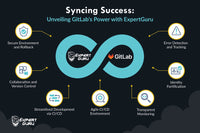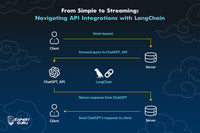Ever felt like you're drowning in a sea of webhooks? In the bustling world of e-commerce, every click, purchase, or change in inventory is like a heartbeat echoing through the digital aisles. For Shopify merchants, staying on top of these pulsating signals is vital. But what happens when the beat becomes a cacophony of thousands of webhooks, threatening to overwhelm your system? Enter ExpertGuru, emerging as a beacon of innovation, offering a comprehensive solution to conquer the webhook challenge and revolutionize real-time Shopify integration.
Navigating the Webhook Deluge: Understanding the Challenge
1. Chaos Unleashed, The Webhook Overflood
Imagine a bustling Shopify store, alive with activity. Every product creation, update, or inventory change sets off a chain reaction—sending webhooks hurtling through the digital atmosphere. Now, multiply this by the countless products and transactions coursing through the veins of the e-commerce giant. The result? Data crashing down like waves on a rocky shore, hammering against servers.
2. The Data Redundancy Conundrum
In the heart of this storm lies the risk of drowning in redundant data. With each product action generating its own webhook, the risk of receiving multiple notifications for a single event is substantial. This causes processing inefficiencies by flooding our system with redundant data and making data management more difficult. If multiple entries are generated for a single product in the Elasticsearch, it can result in unreliable or inconsistent responses. Moreover, constantly deleting and inserting new rows for every webhook update is a taxing process. Managing this torrential flow becomes a Herculean task, complicating data storage and sapping resources faster than you can say "optimization."
3. Server Overload Struggle
Meanwhile, our servers groan under the weight of constant webhook attacks. Every trigger starts a domino effect that results in an increasing number of API requests and processing requirements. There is a palpable strain, which results in interruptions, slowdowns, and constant struggle to keep our infrastructure afloat.
4. Infrastructure Strain, The Cost of Chaos
In this never-ending onslaught, our servers become the frontline warriors, bearing the brunt of escalating operational expenses. Each webhook processed incurs a cost in terms of server resources, API usage, and data storage, leading to rising operational expenses. Balancing the need for real-time integration with the imperative of cost-effectiveness becomes a high-stakes game of resource management, requiring innovative solutions to optimize resource utilization and minimize expenditure.
The ExpertGuru Solution
To tackle these challenges head-on, ExpertGuru devised a strategy that not only handles the influx of webhooks but also optimizes processes and reduces costs.

1. Buffering the Surge with PlanetScale MySQL Database
In our quest to overcome the webhook challenge, we've implemented a strategic buffer zone using a PlanetScale MySQL database. By intercepting and storing webhooks in this buffer before indexing them into Elasticsearch, we've created a robust defence mechanism against the onslaught of incoming data. This buffer not only enhances security but also allows for efficient management and processing of webhook data. With each webhook securely stored in the MySQL database, we gain greater control over data flow and ensure seamless integration with Elasticsearch. This setup enables us to structure the data according to our needs within the MySQL database, retaining only essential fields and eliminating unnecessary ones before sending it to Elasticsearch, further optimizing our data management processes.
2. Strategic Indexing Protocol
Our approach to indexing is not one of haste but of strategic precision. Rather than indexing every single webhook immediately, we've adopted a systematic approach that optimizes resource utilization and minimizes indexing overheads. Through careful aggregation, we index data into Elasticsearch once a day, reducing the burden and ensuring optimal performance. By combining multiple webhooks for the same product into a single update, we eliminate redundancy and streamline the indexing process ensuring that Elasticsearch remains lean and responsive, ready to deliver accurate insights at a moment's notice.
3. Keeping Inventory in Check with Dynamic Management
In the ever-changing world of inventory data, we keep a steady hand on the wheel with our dynamic inventory management. While product recommendations are fetched from Elasticsearch, we cross-reference inventory levels in real-time from the MySQL database. This dual-source approach ensures that product recommendations reflect actual inventory availability, providing both customers and merchants with a dependable and seamless shopping experience.
Conclusion
With ExpertGuru's innovative approach to webhook management, Shopify merchants can rest assured knowing that their integration needs are in capable hands. By leveraging the power of PlanetScale MySQL databases and strategic indexing, we've transformed the challenge of webhooks into an opportunity for growth and efficiency. The integration of this solution directly into the ExpertGuru app enhances its functionality, performance, and cost-effectiveness.
But the journey doesn't end here. As we've triumphed over the hurdles of webhook management, a new frontier beckons: mastering the art of bulk updates in ElasticSearch. Stay tuned for the next chapter in our adventure, where we tackle this formidable challenge.



























